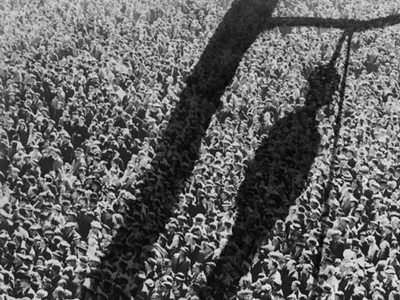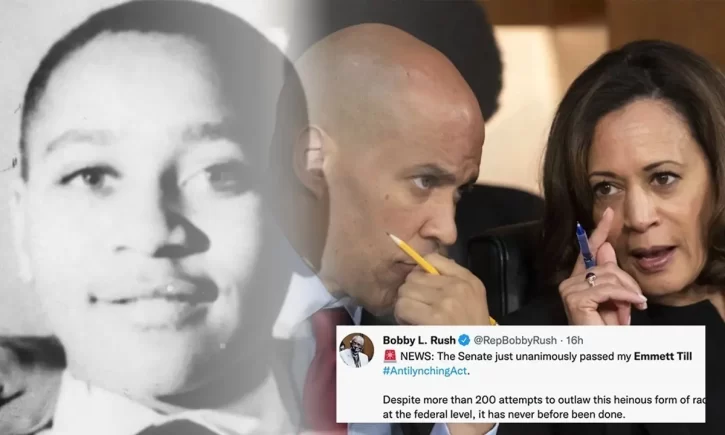Law’s Limits: The Passage of the Antilynching Bill

In 1900, Representative George Henry White of North Carolina, the sole Black law maker in Congress at the time, dared to introduce legislation (HR 6963) that would make lynching a hate crime. To back his case, he submitted an anti-lynching petition from New Jersey residents protesting the lynching of Black Americans for alleged offences, from the most fleetingly minor, to the most serious. The bill stuttered and expired in the Judiciary Committee, never making it out to a House vote.
Such instruments were drafted with an express purpose of targeting that nastily cruel weapon of choice for white insecurity and supremacy. Nearing the end of March this year, US President Joe Biden signed into law the Emmett Till Antilynching Act, its name taken from the teenager murdered in 1955 by a mob for supposedly flirting with a white woman. In being designated a hate crime, those responsible for its infliction, resulting in either death or injury, can face up to three decades in prison in addition to time for other charges.
Lynching had a defining role of keeping Black Americans in their place, a vigilante method of control that received more than a little bit of support from local policing authorities. It symbolised the fangs and threat of Jim Crow and its sheer durability, initially justified as a form of popular sovereignty in the face of tardy justice. Such a form of terror was seminal in compelling the migration of millions of Black Americans from the Southern States to the north and enforcing insidious racial hierarchies.
Between 1877 and 1950, the Equal Justice Initiative claims that 4,400 African Americans met their fate in this way. The NAACP estimates that Black victims accounted for 72 per cent of 4,743 cases of lynching between 1882 and 1968. This took place, despite the warnings from White House occupants that such acts could “not be tolerated in a great and civilized country like the United States” (William McKinley in 1897) or represented “much a loosening of the bonds of civilization” (Theodore Roosevelt in 1906).
Such acts were, as the EJI’s report Lynching in America notes, characterised by a number of features: the lingering fear of interracial sex; a reaction to casual social transgression; a response to allegations of serious crime; the lure of the public spectacle; the escalation of violence against whole African American communities and a hunger to punish specific figures: sharecroppers, ministers and community leaders.
For over a century, legislation remained unpassed. There were 200 failed attempts in Congress to take it to the statute books. “That it took so long is a stain, a bitter stain on America,” stated Senator Chuck Schumer of New York. Senator Cory Booker, Democrat of New Jersey, considered the legislation “a necessary step America must take to heal from the racialized violence that has permeated its history.”
On this occasion, there were no objections in the Senate as it sailed through earlier in the month. But three House members refused to pass it when it reached them in February: Republicans Thomas Massie of Kentucky, Chip Roy of Texas and Andrew Clyde of Georgia.
Massie justified his decision in a social media spray. “Adding enhanced penalties for ‘hate’ tends to endanger other liberties such as freedom of speech.” He was on better ground in noting that the States had already made lynching illegal within their jurisdictions. He also expressed concern about using the “conspiracy” concept, thereby lending the law to be potentially “enforced overbroadly.”
Here are the reasons I voted NO on the Anti-lynching Act last Congress and why I voted NO tonight:
(1) The Constitution specifies only a handful of federal crimes, and leaves the rest to individual states to prosecute.
— Thomas Massie (@RepThomasMassie) March 1, 2022
Roy’s reasons were less systematic (he had time to suggest that this was “an effort to advance a woke agenda under the guise of correcting racial injustice”), arguing that this was a matter best left to the States. His reluctance might be best explained by that old school of thought that a lynching could itself be an example of expeditious justice. “There’s old sayings in Texas about ‘find all in the rope in Texas and get a tall oak tree’,” he stated during a 2021 hearing on Asian-American hate crimes.
Who were the 3 votes against the #AntilynchingAct tonight?👇🏾
Andrew Clyde, GA: Called the 1/6 insurrection a “normal tourist visit”
Thomas Massie, KY: Wrote a bill to allow guns in school zones
Chip Roy, TX: Called lynching an “example of justice”
All Republicans. Surprised?
— Bobby L. Rush (@BobbyLRush) March 1, 2022

Image from occupydemocrats.com
Resistance to the specific framing of such a law has not always been racial or deranged. The fact that a law acknowledging lynching as a hate crime has made it to the federal law books is one thing. Its actual effectiveness is yet to be determined. Those seasoned by penal scepticism, such as Kara Gotsch of The Sentencing Project, see little merit in compiling sentences with severity. The more, the nastier. “We often react and assume that somehow crime will end if we just make sentences longer or punishments tougher.” Her organisation, not without some sense, opposed the bill “because we don’t believe in expanding criminal punishments and creating additional federal crime.”
A similar argument was advanced, with some coherence, by Kentucky Senator Rand Paul, who argued in holding up the Till Antilynching Act in a previous iteration that making lynching a hate crime could lead to a brutal sentencing regime. “This bill would cheapen the meaning of lynching by defining it too broadly as to include a minor bruise or abrasion.” The country’s “national history of racial terrorism demands more seriousness than that.”
There is also a paradox to having laws designed to protect a particular group or community being turned on those very same individuals. Once on the books, prosecutors can feel inclined to use them for other purposes, simplifying the often complex profile of the offender. Victims and perpetrators trade places.
In a June 2021 report from the Stanford Law School and the Brennan Center for Justice, gathered data suggests that Black people made up a quarter of hate crime offenders in 2018, and a third of violent hate crime offenders between 2004 and 2015. Admittedly, weaknesses in the report include its reliance on voluntary reporting and a lack of focus on the prosecution, conviction, and sentencing stages.
That said, this problem is not a new one. The South Carolina Sentencing Reform Commission voted in January 2010 to change the lynching law to “assault and battery by a mob” because it had been used to target the activities of African American gangs.
Fitzhugh Brundage of the University of North Carolina said at the time that the law had seen “a corruption not only of the idea of what a lynching is, but also the historical memory of what a lynching is.” But, showing a distinct indifference to historical memory, Charleston, S.C.’s first black police chief, Rueben Greenberg was pragmatic: the law was highly effective in coping with urban gang activity.
However well intentioned, laws on the statute books will be used and enforced in shifting circumstances, however ironic and disturbing the outcome. Symbolism eventually gives way to the crude inclinations and biases of the law enforcing pragmatist.
Like what we do at The AIMN?
You’ll like it even more knowing that your donation will help us to keep up the good fight.
Chuck in a few bucks and see just how far it goes!
Your contribution to help with the running costs of this site will be gratefully accepted.
You can donate through PayPal or credit card via the button below, or donate via bank transfer: BSB: 062500; A/c no: 10495969










7 comments
Login here Register here-
Kerri
-
Michael Taylor
-
Andrew J. Smith
-
New England Cocky
-
A Commentator
-
wam
-
chaz
Return to home pageRand Paul.
Now there’s a piece of work!
Truly disgusting that three Republicans opposed the bill. It’s a gobsmacking WTaF moment.
If those guys were in Australia they’d probably introduce a bill calling for the reinstatement of shooting parties being sent into Aboriginal communities.
Oh, wait.
In the late 1990s, upon learning I was doing Aboriginal Studies at uni, a young punk said that all Aborigines should be hung. Every last one of them. When I asked why he held that atrocious view he replied that it was because he was hassled by a drunk Aborigine in Adelaide’s nightclub area a few weeks ago.
Upon leaving the pub later that night I was hassled by three drunk white youths in the car park.
Unfortunately there are many in Australian public life and society who hold similar views, but more through dog whistles etc., like the US it also crosses over to Immigrants, Muslims, Jews, ‘the great replacement’ etc.
Further, the language used (slightly tempered in Oz) is from the same ‘swamp’ round Trump’s team, described and named after the ‘architect’ the deceased white nationalist John ‘passive eugenics’ Tanton, admirer of the White Oz policy, founding member of (fossil fuel/auto supported) ZPG Zero Population Growth, muse of Steve Bannon et al., had visited Australia (like others inc. friend Jared Taylor) and his groups advbising Trump still advise media on ‘immigration’ etc.
Tanton, covered by SPLC, was found to contradict his own advice i.e. don’t be seen in public with those extremists who support e.g. lynchings, for him to then hang with KKK types…. pardon the pun.
Rand Paul was at a ‘Values Voter Summit’ event sponsored by the Family Research Council, covered by SPLC in 2014 where Tanton’s Network groups attended (pre Trump); weird eco-system of committed conservative Christians, alt right and libertarians (4 Sep ’14).
With friends like the Americans why do we need enemies?
“With friends like the Americans why do we need enemies?”
I think you were one of those saying reports warning of a Russian invasion of Ukraine were-
* A media beatup
* Murdoch promoting war
” Intended to help make Morrison look like a wartime leader for political advantage
Have you considered a retraction?
Have I missed Binoy’s analysis of the legislative history of Russia regarding human rights, maybe with a focus on LGBT issues?
Michael the essence of racism is ‘they’, ‘them’ and ‘us’. The golf club use to be a place for me to gather the clp racism, sexism and extreme right propaganda. It is no longer commonplace because Aborigines from the baby boomer era are old enough to join the golf vets.
They were excellent footballers and have the soft hands and rhythm needed for golf. There are enough non-clp to make them us.
When ‘them’ become ‘us’ in schools, the gap will disappear.
That wont happen till education departments recognise the white system should accept Aborigines can learn beyond grade 3/
The first step is to value Aboriginal language and culture and admit all educators can learn from Aborigines.
I had a record with nina simone singing Strange Fruit, a song by Abel Meeropo, that has an eerie effect on the listeners. Even conservatives are affected.
When young and into anti pom irish songs, much to the shagrin of my mother’s family who accused me of going native for wearing a sarong, of sacrilege by singing irish freedom songs and, especially the South African branch, were upset at the thought of the black hands of my students touching my white skin.
Lynching looks a lot like terrorism as much as a hate-crime. Speaking of terrorism, there is a multi-city tour coming up in the US soon that will bring to light the global medical tyranny gathering pace. I wonder if there will be any detached, or is that unhinged, reps from the TGA, ATAGI or APHRA speaking at the Crimes Against Humanity tour.